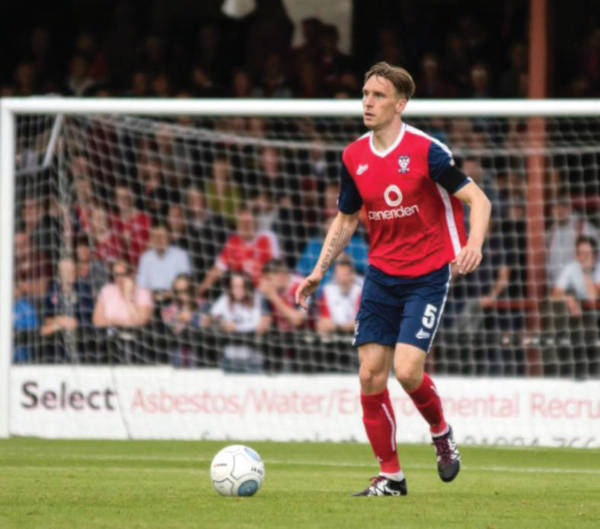During the Ashes, the Australian Captain Steve Smith put himself in an incredibly dangerous position at Lord’s when he returned to the cricket field after being struck by a 92mph bouncer.
Smith was allowed to resume his innings less than an hour later having passed concussion testing.
Returning to play exposed him to the possibility of further blows to the head although, fortunately, he was not hit again. However, he was diagnosed with a delayed concussion the following morning, ruling him out for the remainder of the match.
In football, a reckless attitude to the condition was evident when the Wales’ Manager Ryan Giggs told a packed press conference that player Daniel James was never knocked out or concussed, but was “acting” during a match against Croatia.
Headway regularly supports and hears from people whose lives have been drastically affected by concussion.
One such person is former York City footballer Daniel Parslow. He knows better than most the dangers of playing on after receiving a concussion.

Daniel sustained a traumatic brain injury when an opponent’s shoulder collided with the side of his head during a match against Hereford FC in February 2019.
Immediately after the clash, Daniel was checked over by a physiotherapist, who asked a number of standardised questions in line with the team’s concussion protocols.
Daniel was then deemed responsive enough to return to play.
But just one minute after he made his way on to the pitch and as the whistle blew to signal half-time, Daniel had to stagger to the dressing room and forfeit his place as the team’s centre back for the remainder of the match.
“I knew that I was in a bad way. I had a severe headache, double-vision and felt as though I was going to be sick at any moment,” recalled Daniel.
The next few days were especially difficult for Daniel.
He said: “In the days following the injury, the headaches were chronic and relentless. Even opening my eyes felt like a real struggle.
“The only thing that would ease the pain was lying down with my eyes shut. For three or four days I went through similar cycles, only getting up to eat. I felt constantly exhausted.”
Daniel recently retired from the sport he loves and his club held a benefit match on his behalf to celebrate his years with the team – as well as raise awareness of concussion.
Daniel supports Headway’s calls to introduce more time to conduct assessments following a head injury and is also in favour of temporary substitutions.
He said: “With my incident, I shouldn’t have returned to play - it’s as simple as that. Concussion guidelines were followed but as it stands, this doesn’t allow enough time for the delayed onset of symptoms. Medical professionals need more time to thoroughly assess players without pressure from match officials and fans to restart the game.
“Temporary substitutions are also a must in my opinion. They will help reduce the risk of an athlete receiving that second knock whilst the brain is in a state of trauma - and that could be fatal.”
Matt Brammeier is determined to raise awareness of concussion in the sport that has given him so much. In 2015, during stage six of the Tour of Utah, Matt crashed head-on into a car while travelling at high speed. Matt only realised he was suffering with the long-terms effects of concussion after his wife, a fellow cyclist, was diagnosed with it.

“Before Nikki’s crash I had no idea about the lasting effects of a concussion,” said Matt. “All I knew were the immediate symptoms of a concussion and you should probably seek medical advice if you were having headaches, dizziness and nausea.
“I was never aware of the dangers of a second concussion or of returning to a mentally and physically demanding activity too early.”
Matt hopes the UK’s cycling bodies will sign up to Headway’s Concussion Aware campaign, to raise awareness among athletes about the dangers of the condition.
Matt said: “Headway’s campaign is leading the way to raising awareness of concussions.
“The simple explanations, videos and information on the website are amazingly effective.
“The links and associations with sports’ governing bodies and teams are raising awareness among all sports.”
Pledge your support
Are you involved in an amateur sports club, school, college or university? If so, help to raise awareness and encourage them to sign up to our Concussion Aware campaign and pledge to be more aware of the signs of concussion.
By pledging to take an If in doubt, sit it out! approach, you will be given a digital stamp to display on your website and social media pages in order to demonstrate your club or organisation’s to demonstrate your club’s responsible, no-risk approach to head injuries.
We’ve also developed a toolkit (PDF) to help your sports club or organisation get involved and be concussion aware.
The toolkit is full of useful information, including campaign materials, local support and more.
Managing concussion
It is important that relatives and employers are warned about the possible effects of a minor head injury, and for plans to be made accordingly. These might include not rushing to return to work or classes, keeping stress to a minimum in the short-term, and abstaining from alcohol.
One study showed that almost one third of people with a minor head injury were not working full-time three months after receiving the injury, although other studies have been much more optimistic. Difficulties are certainly made much worse if the person has a mentally demanding job where there is a low margin for error.
Our booklet Minor head injury and concussion provides tips and strategies for coping with the effects of post-concussion syndrome and can be downloaded below.
- Steve Smith image courtesy of Shutterstock.com
Back









